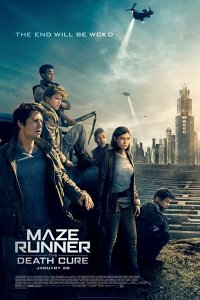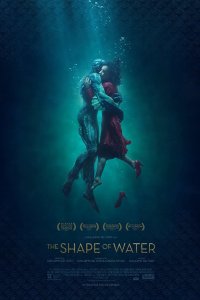Putting the “Romance” Back in “Necromance”: Josh Pearce and Arley Sorg Discuss Dungeons & Dragons: Honor Among Thieves
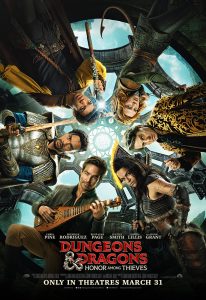 Sword-and-sorcery fantasy is on an upswing. TV series, movies, and spin-offs of multiple properties are everywhere: Game of Thrones, Lord of the Rings, The Witcher, and The Wheel of Time all have recent (and future) adaptations, so it’s no surprise that Dungeons & Dragons — a name that everyone recognizes, whether they’ve played it or not — struck while the iron’s hot.
Sword-and-sorcery fantasy is on an upswing. TV series, movies, and spin-offs of multiple properties are everywhere: Game of Thrones, Lord of the Rings, The Witcher, and The Wheel of Time all have recent (and future) adaptations, so it’s no surprise that Dungeons & Dragons — a name that everyone recognizes, whether they’ve played it or not — struck while the iron’s hot.
And this time they did it right! Unlike the previous D&D film trilogy (released starting in 2000), Honor Among Thieves maintains a light-hearted, fun-filled, action-adventure plot that draws faithfully from its source material without alienating any newcomers.
Arley: I was laughing from beginning. It was literally nonstop laughs. Even during the backstory and set up at the start, where he keeps interrupting his own narrative. It’s almost The Princess Bride vibes in that moment. And then the “Your parole was approved!” joke — that was so Mel Brooks.
Josh: There were so many good jokes. The humor was really good in the graveyard scene, and my favorite part was Chris Pine’s face melting. Oh, my God, I was laughing so hard, I was crying.
Except for a series of flashback gags during a graveyard scene, Honor Among Thieves doesn’t feature any large-scale battle sequences so familiar from Tolkien or George R.R. Martin. Instead, the film focuses on a heist schemed up by a four-player party: Edgin the Bard (Chris Pine), Holga the Barbarian (Michelle Rodriguez), Simon the Sorcerer (Justice Smith), and Doric the Druid (Sophia Lillis).
That tight focus on a small central cast, interpersonal dynamics, and a step-by-step quest with a clearly defined goal all add up to a recognizable RPG experience being played out on the screen. This feels like a gaming campaign, and these characters feel like the result of a group of friends gathered around a table, riffing off each other.
Arley: There was a lot of metanarrative.
Josh: There’s definitely a lot of self-awareness in this. Even the opening title felt like they’re doing a throwback feel to an ’80s fantasy film. It reminded me of the latest Thor movies, which are heavy metal fantasy that just happen to be set in space. Especially Love and Thunder. Metanarrative’s the whole point of D&D, right? And when the druid was asking Chris Pine, “What do you bring to this?” he’s like, “Well, I’m the planner. I make a new plan if this one fails.” And I thought, “You’re describing the DM. You’re the Dungeon Master in this role!” The DM is always going, “I made a plan and now no one’s paying attention to it, they’re just running around, doing their own shit. So I have to pivot and make a new plan to keep everyone on track.”
Arley: They also have these moments that feel like players talking to each other, trying to solve a problem, where they’re like, “Well, I have a rope. I could do this. No, that won’t work.” Even with the hither-thither staff – in role-playing games, there’s almost always a situation where the DM has spent hours creating an awesome campaign, just to have the players figure out some unforseen shortcut that eliminates everything the DM planned. Sometimes because they are too powerful, or too clever, or, like in the movie, have an item that gets used in a way the DM didn’t predict. There’s a scene with the staff that felt true to that kind of moment in playing D&D, and I could even see how the writing decisions, where things went in the movie, as representative of a DMs quick-fix response to keep the game on track! Very cool.
Josh: Yeah, that’s totally true, that’s what it feels like and I love that. They came up with so many different ways to get around that one problem. There’s so much clever writing in this movie, and that’s nice to see because you don’t see it very often.
Also rounding out this rogues’ gallery of a cast are: Chloe Coleman as Edgin’s daughter Kira; Regé-Jean Page as Xenk Yendar the Paladin with a Drax the Destroyer (or Amelia Bedelia) level of literalism; and Daisy Head as Sefina the Red Wizard. Hugh Grant initially seems out of place as rogue and con artist Forge Fitzwilliam, but he ends up just playing an obnoxious British guy, which is very spot on.
Overall, the fight choreography is solid. Michelle Rodriguez absolutely kills it, looking like an MMA fighter tearing up the action scenes. A dungeon crawl through the Underdark involves a duel between the paladin and an assassin as they climb up a giant’s causeway of basalt columns, their swords lighting up with magic. When the music kicks in, it is simply badass.
Arley: Oh, that reminds me actually — this is PG-13. It’s a very bloodless movie. If you think about it, when Holga is wielding the axe, fighting against a bunch of people, she’s basically doing clean takedown moves. She’s not chopping off arms, or even cutting into their bodies, ripping the axe free for a spray of blood. It felt a little off, to be honest – wielding an axe in close combat and not cutting anyone? There’s one decapitation and you see it from so far up that it kind of looks like a video game. That said, I still really liked the fight scenes. I also just really liked Holga. She’s one of my favorites, and the only note I wrote in my notebook, right from the start, was “Holga for the win!”
Josh: I generally liked all the characters and how they all have different abilities, but they were clever with how they used them without becoming one note. I also usually have problems with systems of magic because they just feel like arbitrary. But in this movie they just kept saying, “We can’t solve everything with magic.”
Arley: Yeah. Even that was metanarrative.
Josh: You said in previous reviews that you hate when a character gets so powerful that the writers have to nerf them because they can’t come up with a challenging situation anymore. Here, characters kept gaining or showing off abilities, and then the situation adjusted without bringing the character down. The situation went up to meet them.
Arley: Agree! That’s good writing.
The plot twists its way from one quest point to another as the party gathers the magical objects and allies they need to pull off the heist. Filming took place in Iceland and Ireland, the lands of tax breaks and secondary-world backdrops, so the setting doesn’t get stuck in one place. And although the story structure adheres to a fairly typical campaign format, the different set pieces are entertaining enough that it never feels like the writers are stretching things merely to fill out a runtime.
There is a moment where the writing stumbles a little, some authorial manipulation for the sake of plot convenience. Every member of the party suddenly acts completely out of character and gets captured, simply because the writers need to move them from A to B for the finale. It’s enough to take you out of the movie, but not enough to ruin it. Also, arguably, it’s true to a certain kind of role-playing game experience, where the DM essentially forces events in order to get the group to where they need to be.
The Macguffin telegraphs where the arc is heading; Edgin’s real target in the heist is the “Tablet of Reawakening,” which can only be used once. His goal is to raise his wife from the dead but, as the movie progresses and the characters start to bond, it’s pretty obvious that someone in the party is going to die and they’re going to have to use the tablet on them instead of the wife. Who’s it going to be, and who’s going to have to make the choice, are the emotional core of this story.
Josh: The last D&D-themed movie we reviewed was the Pixar one, Onward. They were going through this whole quest to bring their father back to life, and then, at the end, they kind of fail the quest. The father only comes back for a minute, and only one brother gets to see him. What was the point of the quest? It’s not the thing at the end. You didn’t bring back the person you were trying to. The point was you built a different kind of relationship with the people who are still alive, which is a nice message. Both these movies kind of did the same thing in their own ways.
Arley: That’s a really good point. Also, this movie is very heteronormative.
Josh: Yes, the love story.
Arley: The love stories, plural, feel very much to me like a throwback. Not in a good way.
Josh: The druid and the magician are doing their thing. I was like, oh. The “guy and the girl.”
Arley: This is literally going back to the old sexist film standards where male characters ultimately land a woman as a reward for succeeding in the movie. They had so many options as to where this story arc could have landed. The message: “If you are shy and uncertain, you don’t get her; if you are confident, you get her.” Perhaps even, “Hey, kid, if she says no at first? Just try again later.”
Josh: And the other love stories of Chris Pine and his dead wife, Holga and halfling Bradley Cooper, and then Holga with the other halfling guy at the end.
Arley: When everyone in the party resolves their character arcs with these love stories, then it’s just super heteronormative. And not just that, but everything’s ultimately about romantic relationships. It didn’t actually feel like a natural ending point.
Josh: Showing flashbacks to Chris Pine and his wife under a sheet is such a cliché that I was laughing at it like, is this cliché on purpose? Because it’s so over the top. No one does this seriously in a movie anymore, do they?
Arley: Those tropes, specifically, I felt like they were taking those elements seriously. I did think there was an interesting idea, though, that the paladin said: something like, “You want to bring back your dead wife, but when you die you start another life, and you are taking her away from that life.”
Josh: “On another plane of existence.” Yeah.
Arley: That was an interesting angle. I also have mixed feelings about the diversity. At a glance, it seems very diverse, which is really cool. And roles like the paladin, back in the day, would have been played by someone blond with blue eyes – the supposed idea of “purity” in the mainstream back then. So, I have a lot of love for the fact that it doesn’t look like it would have if this film had been made even five or ten years ago. The way a lot of sword and sorcery movies or fantasy movies did look – think Barbarella or The Beastmaster. But if I’m not mistaken, there are no Asian actors at all? For a big cast with lots of opportunities for diverse casting. And even the Black actors are almost all light in tone, which is a thing – colorism is a known problem in film and TV (I think I last mentioned colorism way back in our review of Us and it’s discussed in The Black Guy Dies First, but really, there are lots of great, thoughtful articles out there on both colorism and sexist tropes, including the idea of women as a reward in narratives). Also, Pine is clearly the leader, though – again – other characters have more agency and actual story in this than they had before. My read is that the film is attempting to walk a careful line, trying to be neither truly progressive, nor truly conservative, hoping to appeal to a broader audience and not upset any potential viewers.
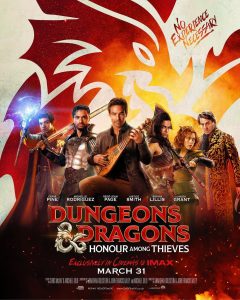 Some standouts among the special effects are Doric’s owlbear form — easily the film’s best-looking CGI creature — and the red dragon lurking in a dungeon. Other computer-animated animals are less impressive, including Doric’s other shapeshifting choices, though those flaws are mostly blurred out by a lot of twirling camera movements. But not all of the monsters are so insubstantial.
Some standouts among the special effects are Doric’s owlbear form — easily the film’s best-looking CGI creature — and the red dragon lurking in a dungeon. Other computer-animated animals are less impressive, including Doric’s other shapeshifting choices, though those flaws are mostly blurred out by a lot of twirling camera movements. But not all of the monsters are so insubstantial.
Josh: I loved how some of the characters were clearly just like puppets or rubber masks or animatronics, like Jarnathan and the dragon at the prison. The cat person —
Arley: The cat looked the worst.
Josh: I think it looked that way on purpose. They’re just like, “We’re putting a puppet in here.” It’s so good.
Arley: I didn’t mind some of the visual mishaps, because there are so many that were fantastic.
Josh: It’s a good mix of creature design, and it all balances out. Gelatinous Cube, classic.
Arley: They really leaned into the classic monsters. A lot of the Easter eggs go all the way back to first edition.
Josh: For the original fans.
Arley: And even the costumes when they’re in the maze are iconic references.
Nerd culture has reached the mainstream, or at least more of a mainstream than in 1974, when D&D was first published, and it balances delicately on a knife edge. On the one hand, bookish misfits and bullied outcasts (counting ourselves) are understandably protective of the safe havens they find during their formative years. On the other, without some kind of population growth — encouraging others to join them there — those vibrant, fantastical worlds stagnate, dwindle, and disappear.
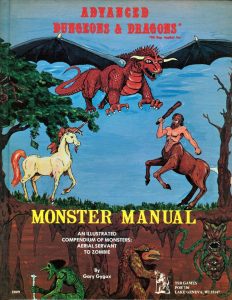 Table-top gaming is a hard barrier to entry. There are so many rules, manuals, pen-and-paper mechanics, math, that many people may be too intimidated to even try it, and feel safer just dismissing it as the realm of so-called weirdos. But there is a recognizable benefit to a broad pool of participants, especially in Dungeons & Dragons, with its collective storytelling and collaborative problem-solving. Films like Honor Among Thieves are an invitation — come play!
Table-top gaming is a hard barrier to entry. There are so many rules, manuals, pen-and-paper mechanics, math, that many people may be too intimidated to even try it, and feel safer just dismissing it as the realm of so-called weirdos. But there is a recognizable benefit to a broad pool of participants, especially in Dungeons & Dragons, with its collective storytelling and collaborative problem-solving. Films like Honor Among Thieves are an invitation — come play!
Josh: The expectations I had going into this — I think I was afraid it was going to be really generic fantasy, until I saw enough from the previews to know they were leaning really hard into the humor. And they didn’t put all the jokes in the preview, either. They left hella stuff hiding up their sleeve.
Arley: We’ve talked here and there about how disappointing the film industry is lately, in that so many movies are half-hearted rehashes, remakes, reboots, sequels, spin-offs, etc. This is proof that it can be done, you can make a quality, entertaining film, even from something like a game, even from something that, in some ways, has been done before. You can make something that feels fresh and new and exciting. I basically think that if you like the previews for this movie, then you’ll like the movie, because the movie is more of what you see in the previews. Despite some social problems, there’s a lot to be surprised and delighted by. Watching this movie really is a good time, and I think it will be just as good if you aren’t a gamer. I saw it with friends I hadn’t seen in a long time, and this movie is perfect for that. It’s also, I think, deliberately designed to be fun for the whole family, as they say.
Insert whatever D&D pun here — it’s a critical hit, they’re on a roll — Honor Among Thieves is a fun time, and worth a watch.
Directed by: John Francis Daley & Jonathan Goldstein
Written by: John Francis Daley, Jonathan Goldstein, Michael Gilio & Chris McKay
Starring: Chris Pine, Michelle Rodriguez, Regé-Jean Page, Justice Smith, Sophia Lillis, Hugh Grant, Chloe Coleman & Daisy Head

ARLEY SORG, Senior Editor, has been part of the Locus crew since 2014. Arley is a 2022 Kate Wilhelm Solstice Award recipient and a 2023 Space Cowboy Award recipient. He is also a 2021 and 2022 World Fantasy Award finalist and a 2022 Locus Award finalist for his work as co-Editor-in-Chief at Fantasy Magazine. He is a 2022 Ignyte Award finalist in two categories: for his work as a critic, and for his essay “What You Might Have Missed” in Uncanny Magazine. Arley is Associate Editor and reviewer at Lightspeed & Nightmare magazines, columnist for The Magazine of Fantasy and Science Fiction, and interviewer at Clarkesworld Magazine. He grew up in England, Hawaii, and Colorado, and lives in the SF Bay Area. A 2014 Odyssey Writing Workshop graduate, he can be found at arleysorg.com – where he has started his own “casual interview” series with authors and editors – as well as Twitter (@arleysorg) or Facebook.
JOSH PEARCE has stories and poetry in Analog, Asimov’s, Beneath Ceaseless Skies, Cast of Wonders, Clarkesworld, IGMS, Nature, and more. Find him on Twitter: @fictionaljosh, or at fictionaljosh.com. One time, Ken Jennings signed his chest.
 While you are here, please take a moment to support Locus with a one-time or recurring donation. We rely on reader donations to keep the magazine and site going, and would like to keep the site paywall free, but WE NEED YOUR FINANCIAL SUPPORT to continue quality coverage of the science fiction and fantasy field.
While you are here, please take a moment to support Locus with a one-time or recurring donation. We rely on reader donations to keep the magazine and site going, and would like to keep the site paywall free, but WE NEED YOUR FINANCIAL SUPPORT to continue quality coverage of the science fiction and fantasy field.
©Locus Magazine. Copyrighted material may not be republished without permission of LSFF.




